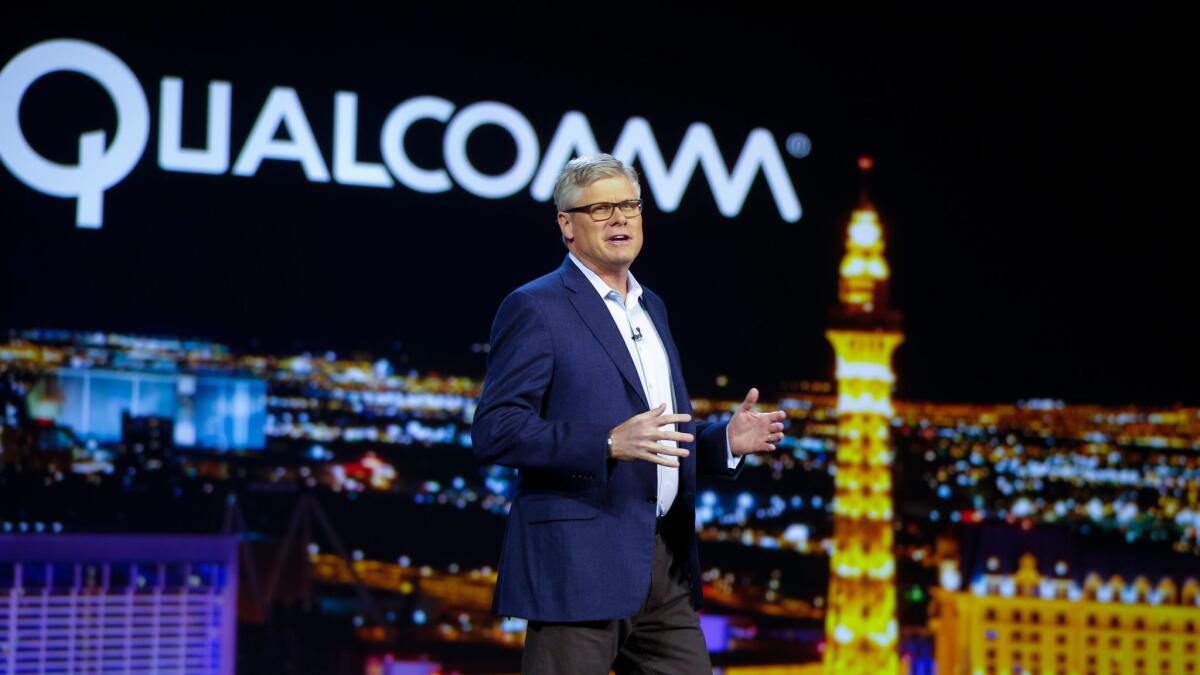South Korean court rejects Qualcomm’s antitrust challenge

Qualcomm Inc. has lost its legal bid in South Korea to postpone implementation of changes in the way it licenses cellular patents — moves that were called for last year by that country’s anti-monopoly regulator.
The San Diego company confirmed late Monday that the Seoul High Court had denied Qualcomm’s application to shelve a remedial order by the Korea Fair Trade Commission, or KFTC, over its patent licensing practices.
Qualcomm sought to delay the measures imposed by the regulator while appealing its findings in court.
The Seoul High Court ruled that Qualcomm’s business wouldn’t suffer irreparable harm if the order takes effect while the company appeals. Irreparable harm typically is the legal threshold that courts use when determining whether to grant a stay.
Qualcomm said it would immediately appeal the Seoul High Court’s decision to the Korea Supreme Court.
Late last year, the KFTC fined Qualcomm more than $900 million and ordered changes in the way it licenses patents — most notably that it must negotiate patent licenses with rival cellular-modem chip makers such as Intel and MediaTek.
Such a move could pave the way for patent licensing based on the price of modem chips.
That’s counter to the way Qualcomm and other cellular patent holders license their technologies today, which is based on a percentage of the sales price of the entire smartphone.
Presumably, licensing patents at the chip level would cost smartphone makers less — though that’s not clear.
Qualcomm argues that its thousands of core cellular patents aren’t implemented on just one chip. It takes a host of technologies inside the phone, in cellular towers and the wider cellular network to deliver fast wireless Internet to smartphones. That’s why the cellular industry has calculated patent royalties based on the smartphone price for three decades.
But Qualcomm’s patent licensing business model is under fierce attack not only in South Korea but also in the U.S., where Apple and the U.S. Fair Trade Commission have filed lawsuits alleging that Qualcomm abuses its market power as a cellular modem supplier to illegally overcharge companies that license its patents.
The KFTC order does not invalidate any of Qualcomm’s more than 300 existing license agreements with smartphone makers, the company said. It does call for Qualcomm to engage in good-faith negotiations with chip companies seeking a patent license and to negotiate possible amendments with current licensees upon request.
Although it failed to win a delay in implementing the KFTC order, Qualcomm is still fighting the overall legality of the KFTC’s action. The Seoul High Court is expected to hear Qualcomm’s appeal at a later date.
“Qualcomm continues to believe that the KFTC’s decision is not supported by the facts and law, and was the product of a hearing and investigation that denied Qualcomm fundamental due process rights,” the company said in a statement.
Qualcomm also contends that the KFTC exceeded its authority by inappropriately seeking to regulate intellectual property rights in other nations, including the United States.
Qualcomm shares fell $2.02, or 3.9%, to $50.03 on Tuesday.
ALSO
David Lazarus: Even as Wells Fargo scandal deepens, GOP lawmakers push bank deregulation
United Technologies buys Rockwell Collins for nearly $23 billion
Counterfeit Yeezys and the booming sneaker black market
UPDATES:
5:10 p.m.: This article was updated with Qualcomm’s closing stock price.
This article was first published at 8:25 a.m.







